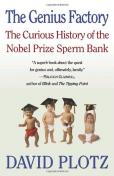BKMT READING GUIDES
The Genius Factory: The Curious History of the Nobel Prize Sperm Bank
by David Plotz
Paperback : 288 pages
1 club reading this now
0 members have read this book
Introduction
It was the most radical human-breeding experiment in American history, and no one knew how it turned out. The Repository for Germinal Choice–nicknamed the Nobel Prize sperm bank–opened to notorious fanfare in 1980, and for two decades, women flocked to it from all over the country to choose a sperm donor from its roster of Nobel-laureate scientists, mathematical prodigies, successful businessmen, and star athletes. But the bank quietly closed its doors in 1999–its founder dead, its confidential records sealed, and the fate of its children and donors unknown. In early 2001, award-winning columnist David Plotz set out to solve the mystery of the Nobel Prize sperm bank.
Plotz wrote an article for Slate inviting readers to contact him–confidentially–if they knew anything about the bank. The next morning, he received an email response, then another, and another–each person desperate to talk about something they had kept hidden for years. Now, in The Genius Factory, Plotz unfolds the full and astonishing story of the Nobel Prize sperm bank and its founder’s radical scheme to change our world.
Believing America was facing genetic catastrophe, Robert Graham, an eccentric millionaire, decided he could reverse the decline by artificially inseminating women with the sperm of geniuses. In February 1980, Graham opened the Repository for Germinal Choice and stocked it with the seed of gifted scientists, inventors, and thinkers. Over the next nineteen years, Graham’s “genius factory” produced more than two hundred children.
What happened to them? Were they the brilliant offspring that Graham expected? Did any of the “superman” fathers care about the unknown sons and daughters who bore their genes? What were the mothers like?
Crisscrossing the country and logging countless hours online, Plotz succeeded in tracking down previously unknown family members–teenage half-brothers who ended up following vastly different paths, mothers who had wondered for years about the identities of the donors they had selected on the basis of code names and brief character profiles, fathers who were proud or ashamed or simply curious about the children who had been created from their sperm samples.
The children of the “genius factory” are messengers from the future–a future that is bearing down on us fast. What will families be like when parents routinely “shop” for their kids’ genes? What will children be like when they’re programmed for greatness? In this stunning, eye-opening book, one of our finest young journalists previews America’s coming age of genetic expectations.
From the Hardcover edition.
Editorial Review
Robert Graham, the oddball inventor and millionaire at the heart of David Plotz's book, The Genius Factory, is the archetype for the cliché, "more money than brains." It was Graham who reckoned America was going to hell in a hand basket and the best way to halt the trend was to impregnate women with sperm donated by Nobel Prize winners and other overachievers (providing they were smart and white). Forget for the moment the not-so-thinly-veiled racism powering the whole eugenics movement that served as the backbone of Graham's Repository for Germinal Choice. Graham's super-sperm idea also conveniently overlooked the fact that the women carrying the babies would also leave a genetic imprint while ignoring the nurture-versus-nature argument. Though Plotz addresses these concepts in his book, the real reason to recommend it is its characters, the sperm bank progeny Plotz unearths through intense and covert legwork. The book's humor is also a selling point: "In abstract, donating sperm seemed fundamentally silly. But actually doing it was seductive," Plotz writes. "I had been accepted by the ultraexclusive Fairfax Cryobak! My sperm was 'well above average'! My count was 105 million! What's yours, George Clooney?" Elsewhere, Plotz writes, "By late 1980, Graham found himself presiding over a Nobel Prize sperm bank that had no Nobel Prize donors, no Nobel sperm left in storage and no Nobel babies. None of the first three women who'd been inseminated with Nobel sperm had gotten pregnant. In fact, no one inseminated with the Nobel sperm ever got pregnant. The Nobel Prize sperm bank would never produce a single Nobel baby." No matter. Graham's experiment, which did produce dozens of non-Nobel babies, was a success in one regard: it made for a heck of a story. And in Plotz's capable hands, it also makes for a heck of a book. --Kim HughesDiscussion Questions
No discussion questions at this time.Book Club Recommendations
Recommended to book clubs by 0 of 0 members.
Book Club HQ to over 90,000+ book clubs and ready to welcome yours.
Get free weekly updates on top club picks, book giveaways, author events and more








